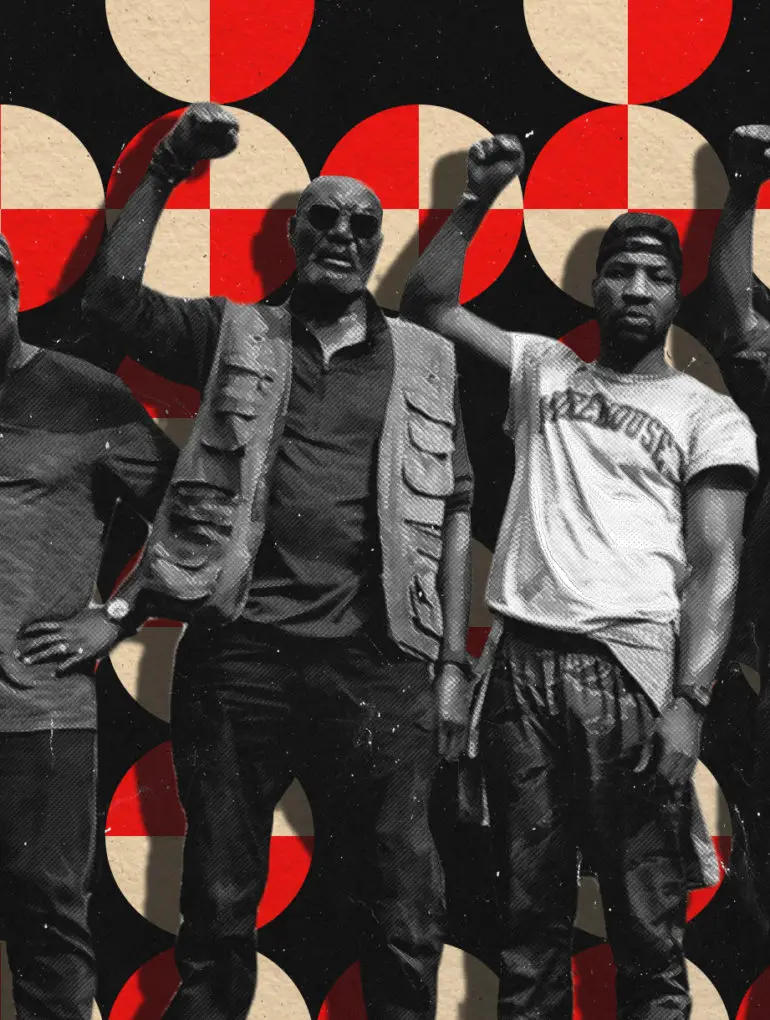In 1968, my father served in the Vietnam War as an Air Force helicopter mechanic, and though he was lucky enough to avoid trudging through the jungle with a machine gun, what he saw and experienced there was enough to send him home with a few wires frayed and sparking. Let’s just say that he was less than thrilled by Fourth of July fireworks.
Like many American kids who were sired by Vietnam vets, I was raised watching movies based on the conflict on an almost weekly basis. Over the course of many Saturdays and Sundays we watched dozens upon dozens of the films, which ranged in quality from abysmal (Firebase Gloria, Green Berets) to great (Platoon, Full Metal Jacket, Good Morning Vietnam). It wasn’t until many years later that I realized how these weekend viewings were more than mere downtime—it was dad’s attempt at processing what he and so many others from his generation had gone through.
Flash forward a couple of decades and I found myself traveling through Vietnam in an attempt to reconcile and understand some of the stories I’d been told by my then-deceased father. So far I’ve spent some six months in the beautiful little nation, including two months in Hanoi, which I’m sure would have blown the old man’s mind. It’s unlikely that in 1968 he would have foreseen his son one day living peacefully in the “enemy” capital, where KFC, Domino’s, and McDonald’s can today be found in abundance.
With all this attachment to the subject matter, I was excited to learn that the great Spike Lee had released his own take on the war with Da 5 Bloods. Much to my surprise, I was in for a disappointment.
The Legacy of Bad Representation
While it had its pluses, I found many faults with Da 5 Bloods, and while the reviews were almost universally positive—glowing, even—it turned out that I wasn’t alone in my appraisal.
A few years back I came across a book by Vietnamese-American writer Viet Thanh Nguyen called the Sympathizer. A refugee of the war, his debut novel dealt with the war itself and the subsequent experiences of refugees who fled to the United States. It was recognized with a Pulitzer Prize, and is one of my favorite novels from the past twenty years. Nguyen just completed its sequel—The Committed—which comes out early next year, and it’s at the top of my “can’t wait” list.
Anyways, when Nguyen live-tweeted Da 5 Bloods, it was clear that he was less than thrilled by the film.
Within just a few minutes, we get to the crux of the problem with Da 5 Bloods:
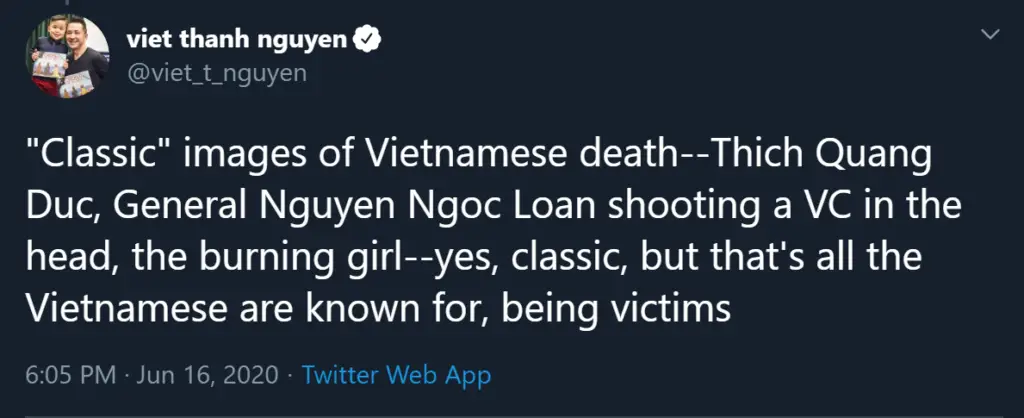
Perhaps the biggest issue with the entire Vietnam War film genre involves the poor representation of the Vietnamese people. Almost without exception, they end up relegated to secondary roles, as if they were an afterthought in the war that decimated their own country.
It’s only natural that a people would emphasize their own role in a story, but American films on the subject consistently neglect the fact that for the Vietnamese this war—which they refer to as the American War—was fought on their land. Their homes were destroyed. Their families were torn apart. They had thirty times more people killed than the Americans.
Perhaps the biggest issue with the entire Vietnam War film genre involves the poor representation of the Vietnamese people
I don’t bring this up to minimize American losses, but to highlight how inaccurate the American perception of the war tends to be. Imagine if the French produced dozens of films about the American Revolutionary War in which the support forces sent from France were the protagonists while the American colonists were perpetual sidekicks?
Going into the film, I assumed that Spike Lee would handle Vietnamese representation better. The importance of black representation is, after all, a key aspect of his work. But for the most part, he ended up falling back on tired genre tropes. As Nguyen pointed out in his tweets then later in an article for the New York Times, “The Vietnamese appear as the tour guide, the sidekick, the ‘whore,’ the mixed-race child, the beggar and the faceless enemy, all of whom play to American desires and fears.”
The strongest aspect of the movie is the core concept. A group of black American soldiers returning to Nam is a powerful, unexamined story. Nguyen agreed:
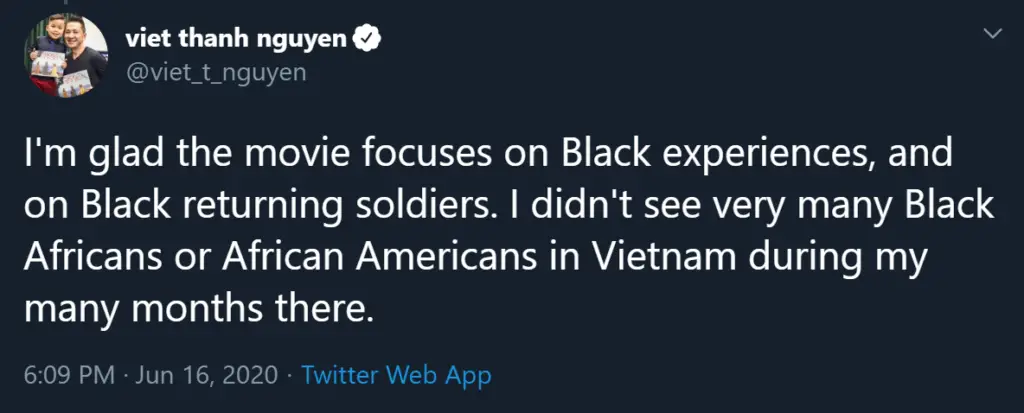
That being said, it’s impossible to neglect the fact that the Vietnamese are once again sidelined:
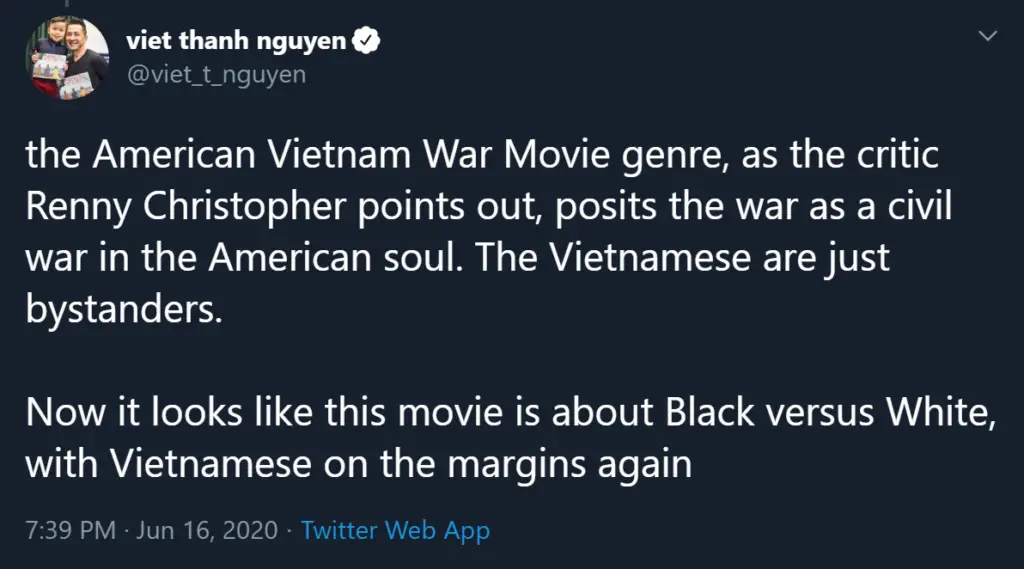
And the problems don’t stop there. Narratively speaking, there were some pretty questionable and even flat out nonsensical choices made. For example, when the American protagonists found the McGuffin—err, I mean—the gold they’d come for entirely by accident. I wasn’t alone in this observation:

Or how the French deminers, who in the film, Nguyen reminded, get all the credit for finding wayward mines rather than the Vietnamese (yet another example of the foreign savior complex), decide to partner up with and befriend the Americans who had just taken them captive, even after one of their colleagues is killed. They are—in the literal sense of the word—unbelievably cool with these old American dudes who have been holding them at gunpoint and getting them blown up.
And there are a range of other creative and technical issues (who chose that music???) that add up to what is—in my opinion—a subpar Vietnam War film. Like Saturday afternoon, next-on-TNT-after-Chuck Norris bad. And, like Nguyen, I’ve seen virtually every movie in the genre and I recognize a quality entry when I see one.
I’m somewhat mystified by the near-universal praise the film has received, and that’s coming from a major fan of his work. Do The Right Thing, She’s Gotta Have It, Malcolm X, BlacKKKlansman, Summer of Sam—these and others are great movies.
But knowing what I do about the Vietnam War, and having spent a good amount of time in Vietnam with the Vietnamese people (who most definitely consider themselves the central figures in the story of the war), I can’t get past the bad representation.
But I’ll let Nguyen explain.
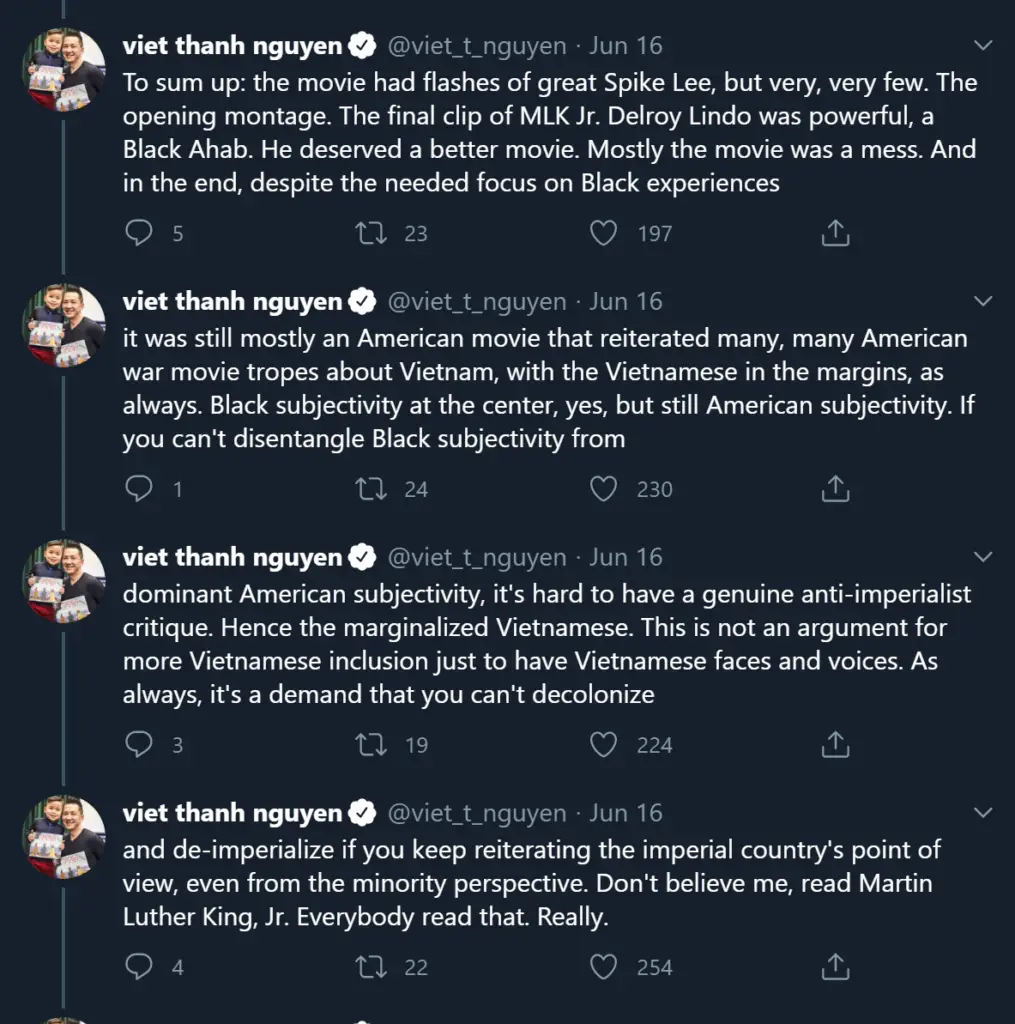
The King speech he’s referencing is, btw, “Beyond Vietnam: A Time to Break Silence.”
And one last thing:


